Event Date: 10th , 24th May, 7th , 21st June, 5th July 2021, 27th January, 2022
Venue: Online
The Digital Citizenship Plus (DC+) Seminar Series, convened by Dr. Xiao Hu and Dr. Frank Reichert of the Faculty of Education at The University of Hong Kong (HKU), is designed as a platform for dissemination and intellectual explorations of research related to digital citizenship. The DC+ Seminar Series is supported by the Learning and Assessment for Digital Citizenship project conducted jointly by colleagues from HKU and HKUST (The Hong Kong University of Science and Technology) and funded by the RGC Theme-based Research Scheme. This series will explore, in collaboration with scholars and researchers in other countries and regions, the impact of digital media on the everyday life of children and youth, and on their development as citizens in an increasingly technology-intensive and globally-connected world. Seminars will report on current research findings, critically examine conceptual and methodological issues and explore research trends and opportunities related to digital citizens and digital citizenship.
Conveners:
Dr. Xiao Hu
Dr. Frank Reichert
Date: 27 January 2022 (Thursday)
Time: 4:00 pm - 6:00 pm (HKT) (Calculate your local time)
Venue: Online via Zoom
Language: English
Discussant: Dr. Greta Björk Gudmundsdottir, Department of Teacher Education and School Research, University of Oslo
Enquiry: dcitizen@hku.hk
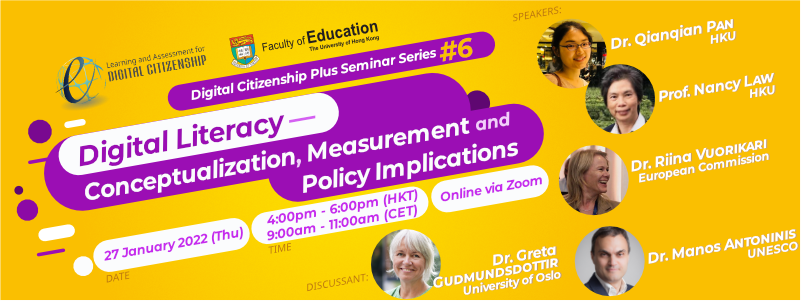
This talk reports on the design and findings from the Learning and Assessment for Digital Citizenship project, which is a longitudinal panel study involving 3 age cohorts from primary to upper secondary. An assessment instrument was developed to provide a validated scale for measuring the digital literacy of the three age cohorts over the two-year period. Data was collected in the first half of 2019 and 2021 respectively. The timing of the study meant that the observed changes in digital citizenship development was inextricably influenced by the pandemic as well as the actions different stakeholders took to support the children’s learning. Implications from the findings for policy and practice at school and policy levels will be discussed.
About the speaker(s):
Professor Nancy Law
Prof Nancy Law is a Professor in the Faculty of Education at the University of Hong Kong, and the Founding Director for the Centre for Information Technology in Education (CITE). She is currently leading the Learning and Assessment for Digital Citizenship and eCitizen Education 360 projects as their Principal investigator.
Dr Qianqian Pan
Dr Qianqian Pan joins the Learning and Assessment for Digital Citizenship project as a Post-doctoral Fellow at The University of Hong Kong and takes the responsibility of developing and validating the digital literacy assessment. She is trained in psychometrics and advanced quantitative research methodology with research interests and experience in diagnostic classification models, longitudinal data analysis, etc. She is a Co-I of eCitizen Education 360 under the Learning and Assessment for Digital Citizenship project, which won the HKU Faculty Knowledge Exchange (KE) Award 2021.
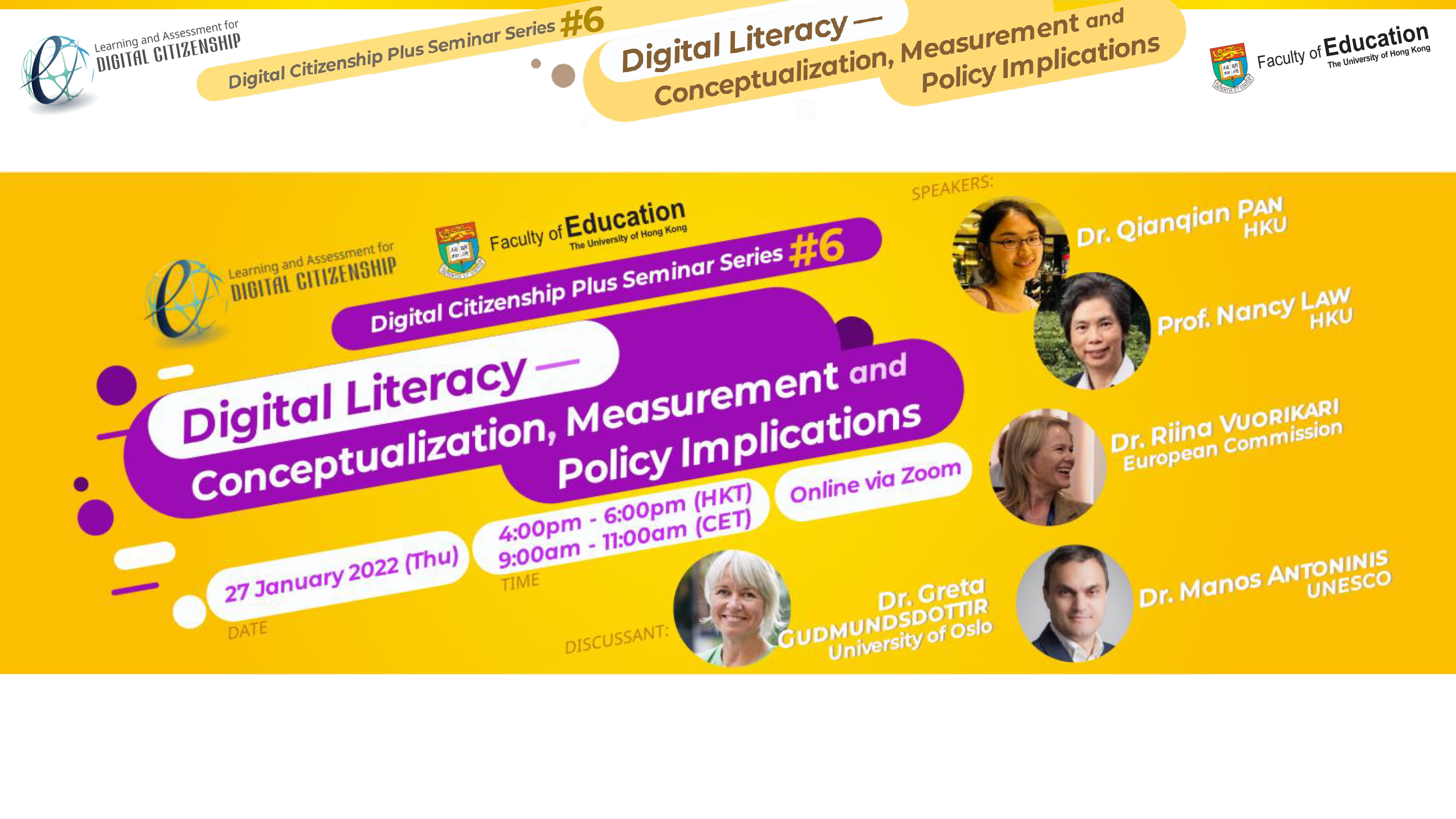 Talk 1 Presentation Download
Talk 1 Presentation DownloadAs part of the DigComp update, the EU is currently considering what knowledge, skills and attitudes do citizens need to engage with AI systems in a confident, critical and responsible way for learning, at work, and for participation in society. This talk will give a brief update of the work and showcases some of the proposed statements to illustrate how a reference framework can adapt to rapidly changing world around it. Secondly, the talk will focus on how the EU uses its Digital Skills Index to set policy targets (e.g. 80% of citizens to have basic digital skills by 2030) and monitors its success.
About the speaker(s):
Dr Riina Vuorikari
Dr. Riina Vuorikari joined the Joint Research Centre (JRC) of the European Commission in July 2013. Currently, her work focuses on the update of the Digital Competence framework for Citizens (2.2). Her other themes cover areas such the use of AI in Education and Remote schooling at the time of Covid-19. Dr. Vuorikari has degrees in education (M.Ed in Finland), hypermedia (DEA in France) and her PhD was completed in 2009. She works in the field since 1999.
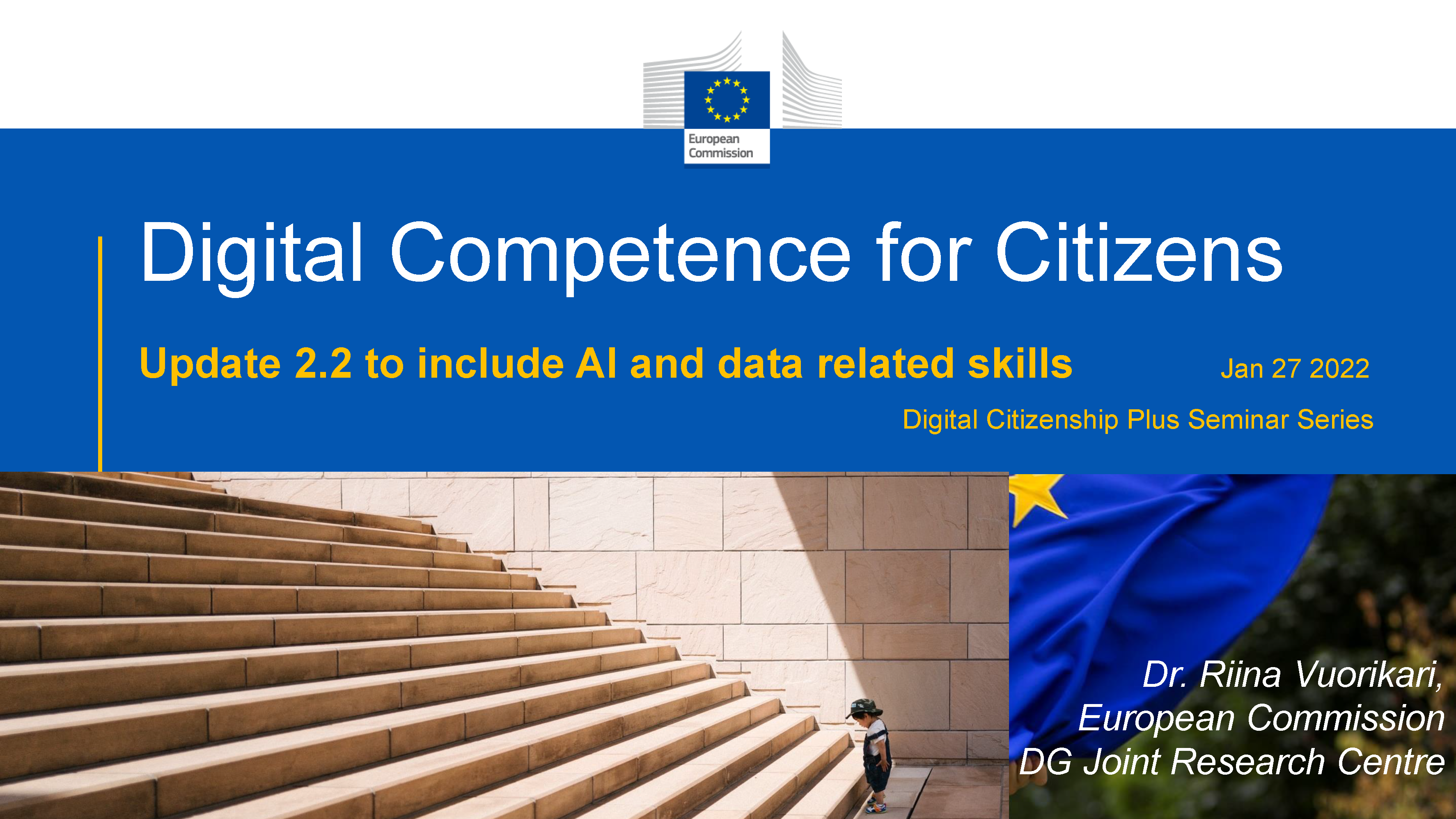 Talk 2 Presentation Download
Talk 2 Presentation DownloadWhile it is commonplace to say that children, youth, and adults need to be digitally literate, the Sustainable Development Goals, which express the global development agenda, did not explicitly refer to a target on digital literacy. It is only indirectly through a target of the education goal on “relevant skills … for employment, decent jobs and entrepreneurship” that the global monitoring framework has included indicators touching upon this area of policy interest. This talk will present the efforts made so far at the international level to define and operationalize these indicators and will invite participants to a discussion on how research studies can be used to inform better measures and policies in the future.
About the speaker(s):
Dr Manos Antoninis
Dr. Manos Antoninis is the Director of the Global Education Monitoring (GEM) Report, UNESCO Manos joined the GEM Report in 2011 and has been its director since 2017. He was previously responsible for the monitoring section of the report. He coordinated the financing gap estimates for the 2030 education targets, the projections on the achievement of universal primary and secondary education completion, and the World Inequality Database on Education. He has been representing the report team in the Technical Cooperation Group on SDG 4 indicators, which he is currently co-chairing; in that context he collaborated with CITE in a study that examined whether the European Commission’s definition of digital competence could be applied at global level as a basis for monitoring. He previously worked for 10 years as an economist on public finance, monitoring and evaluation projects in education in Africa, Asia, and South-eastern Europe.
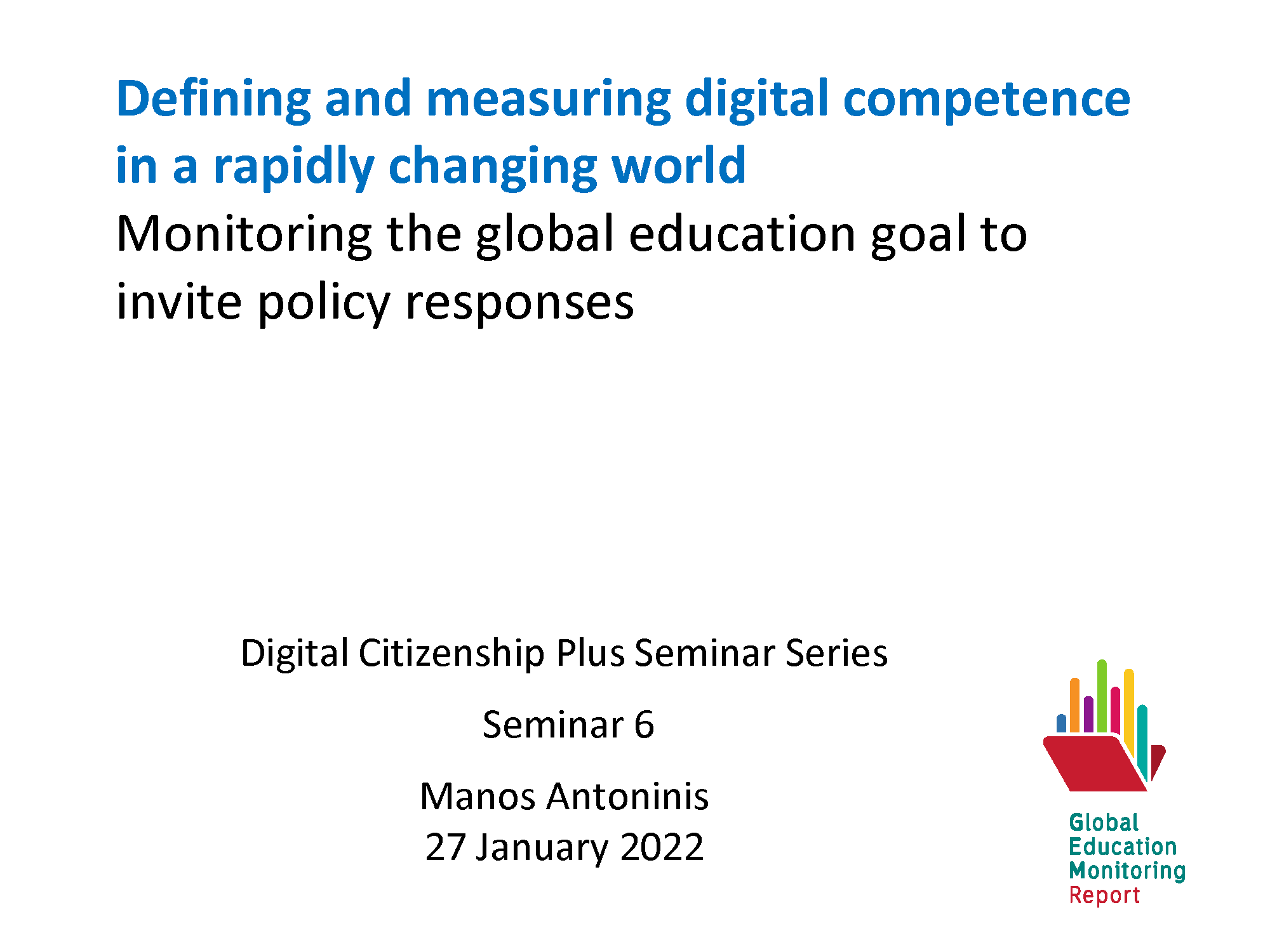 Talk 3 Presentation Download
Talk 3 Presentation DownloadAbout the discussant::
Dr Greta Gudmundsdottir
Dr Gudmundsdottir has conducted research on digital competence of students and teachers for many years both through quantitative large-scale studies such as the international computer and information literacy study (ICILS) and OECD‘s Teaching and Learning International Survey (TALIS) but also through qualitative studies such as the EU Horizon project on the Digital Generation (DigiGen) and the Erasmus+ Developing ICT in Teacher Education (DICTE).
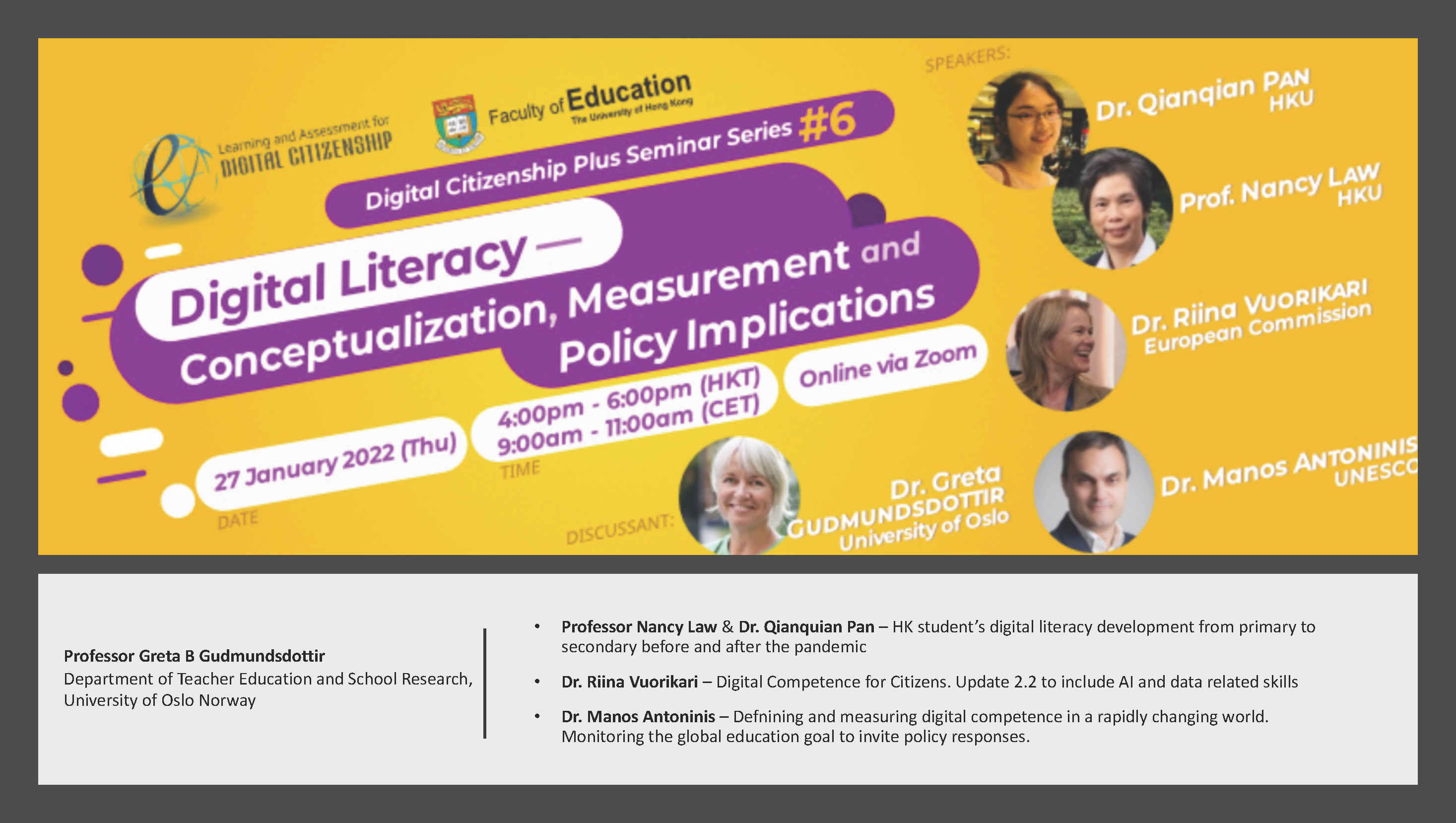 Presentation Download
Presentation DownloadDate: 5 July 2021 (Monday)
Time: 3:30 pm - 4:45 pm (HKT) (Calculate your local time)
Venue: Online via Zoom
Language: English
Discussant: Professor Sonia Livingstone, Department of Media and Communications, The London School of Economics and Political Science
Enquiry: dcitizen@hku.hk
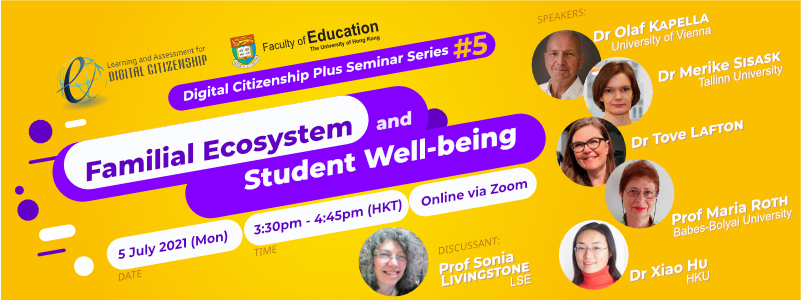
Most children in Europe live in media-rich households with access to a variety of digital devices. They can be described as the ‘digital generation’. In this paper findings from a large-scale EU project ‘DigiGen’ aims to highlight significant knowledge about how the digital generation uses and is affected by digital technology in their everyday lives. One important part of children’s everyday lives is the family, an ecosystem that is undergoing change due to increased digital technology. Yet, we know too little about digital technology use within the family and its impact on family communication and daily life. This paper takes a closer look at how digital technology impacts the family ecosystem aiming to examine the potential positive and negative impacts on family life and communication. We contribute to a deeper understanding of the challenges, advantages and impacts associated with this technology. The data reported on includes interviews with different family members and focus group interviews with children ages 5-10 in four European countries. The data shows that omnipresence of digital technology shapes the lives of children and affects family dynamics. Even for families affected by socio-economic depravations digital technologies are part of ‘doing family’ on a daily basis. ‘Doing family’ expresses the fact that family life is nothing static but is reproduced by each family member and their mutual interactions. This technology is essential for joint family activities and helps to create a sense of ‘we-ness’ that in turn supports family cohesion and is one way of ‘doing family’.
About the speaker(s):
Dr Olaf Kapella
Olaf Kapella is senior researcher and research coordinator at the Austrian Institute for Family Studies at the University of Vienna. His main research areas are evaluation studies on family policy and children rights and child welfare, the development and evaluation of sexuality education programs and violence research. Besides his academic work, he is also working as a therapist with the focus on young people and men. He is trainer in several post gradual training courses on health and sexuality education and sexuality counselling, national and international. He leads the work of the Austrian Institute for Family Studies at the University Vienna within the DigiGen project and is work package leader of WP 3 of the DigiGen project.
Dr Merike Sisask
Merike Sisask is a Professor of Social Health Care at Tallinn University, School of Governance, Law and Society (SOGOLAS) and Board Member of the Estonian-Swedish Mental Health and Suicidology Institute (ERSI). Research interests: public health view on suicidality and mental health; interventions for suicide prevention; (social) media and suicide; digital transformation and well-being.
Dr Tove Lafton
Tove Lafton has her PHD in how technology affect the pedagogical working and thinking in early years. Her main research interests are work-based student learning, digital literacy in early years, pedagogical leadership and reflection as a tool for learning and development.
Professor Maria Roth
Maria Roth is a Researcher at the Faculty of Sociology and Social Work. She is one of the founders of the Social Work Program and of the Master Programme in Children’s Rights in Babes-Bolyai University, Cluj, Romania. As a practitioner psychologist she has worked with children in schools, hospitals and orphanages. She has benefitted of a Fulbright scholarship in UNC Chapel Hill, US, and participated in several European Erasmus exchanges. Along the 30 years of academic career, she did research and published in Romanian, Hungarian, and in English in the area of developmental psychology, child well-being, adverse childhood experiences, human rights, vulnerable (Roma) population and youth participation. She has developed courses at bachelor, and doctoral level in Developmental Psychology, Children’s rights; Child protection; Program and service evaluation; Social Work Methods; Ethics in research with children; and Comparative Research.
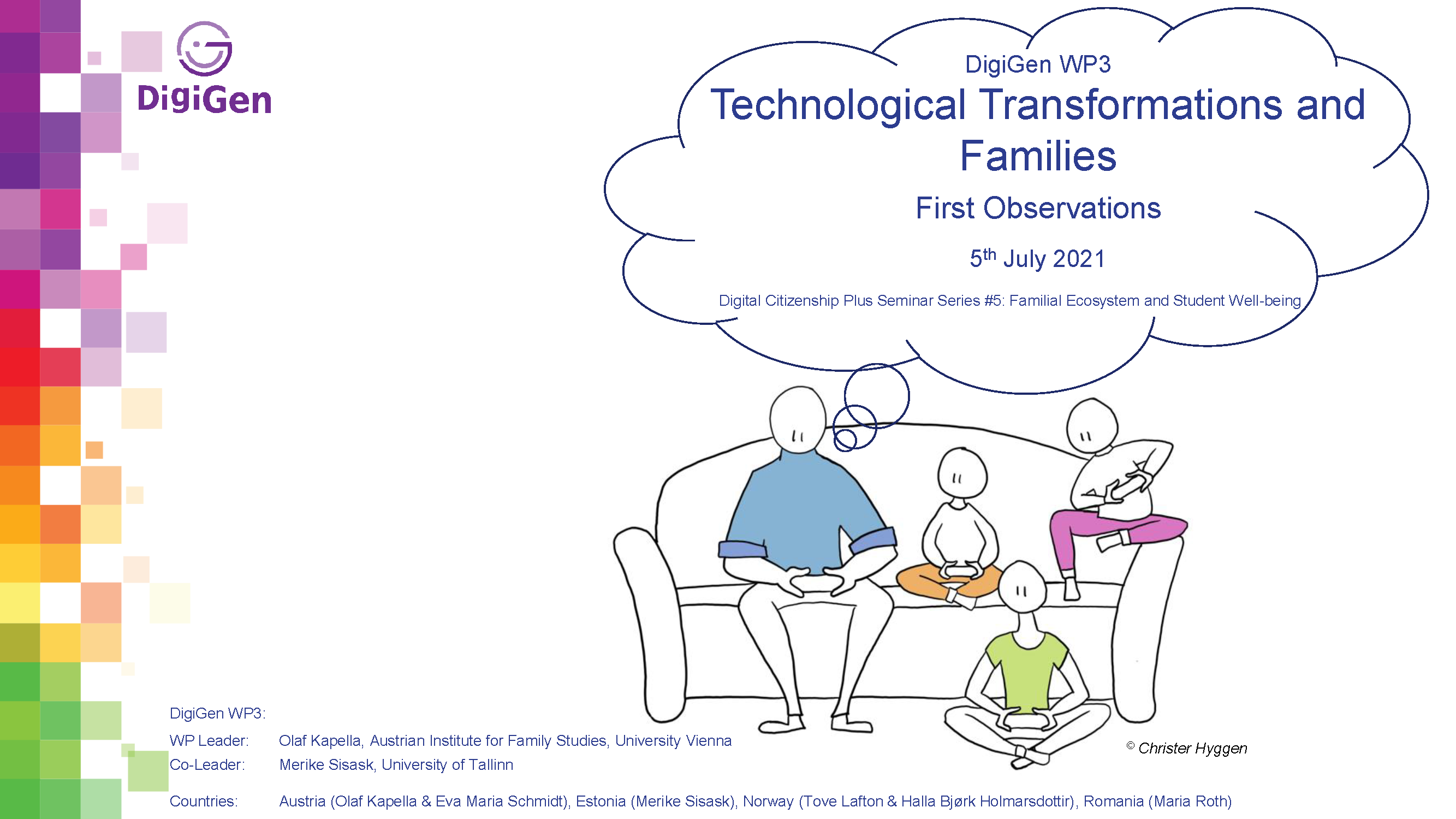 Talk 1 Presentation Download
Talk 1 Presentation DownloadThe COVID-19 pandemic has led to school closure and home confinement globally. There is an urgent callto understand the impacts of the pandemic on students' well-being. This talkreports a study that investigates how students' physical, mental, social, digital, and academic well-being were affected during three different phases of school suspension as well as the factors that may protect or aggravate students against various potential challenges to their well-being during the pandemic. Thisstudy sampled 22 secondary school students, 20 parents, and 3 teachers from two local secondary schools in Hong Kong. Through leveraging mobile apps and wearable devices, a semi-automated Day Reconstruction Method (DRM) was appliedduring three weeks from April to July 2020, to measurestudents' multifaceted well-being on a daily basis, including indicators of physical activity, sleep, and digital device usage. In addition, a diary with guiding questions was designed to elicit students' reflection on important or major events during the day.Retrospective surveys were employed to collect multifaceted subjective measures of students' well-being (e.g., social network, academic engagement) during each of the three phases. In-depth interviews with students, parents, and teachers elicited in-depth explanations of the observations. Results highlight the risks of home confinement,positive benefits of school resumptionand the reasons behind the changesof students' well-being during the three phases. This work contributesto an in-depth understanding of students' multifaceted well-being during the pandemic. Its methodological and practicalimplications will also be discussed.
About the speaker(s):
Dr Xiao, Hu
Xiao Hu is an Associate Professor in the Human Communication, Development and Information Science (CDIS) Academic Unit at the Faculty of Education University of Hong Kong. Her research expertise is in technology-enhanced learning, learning analyticsand recommender systems, with an emphasis on collaborative learning and self-regulated learning. She is a co-leader of WP4 in the eCitizenship project.
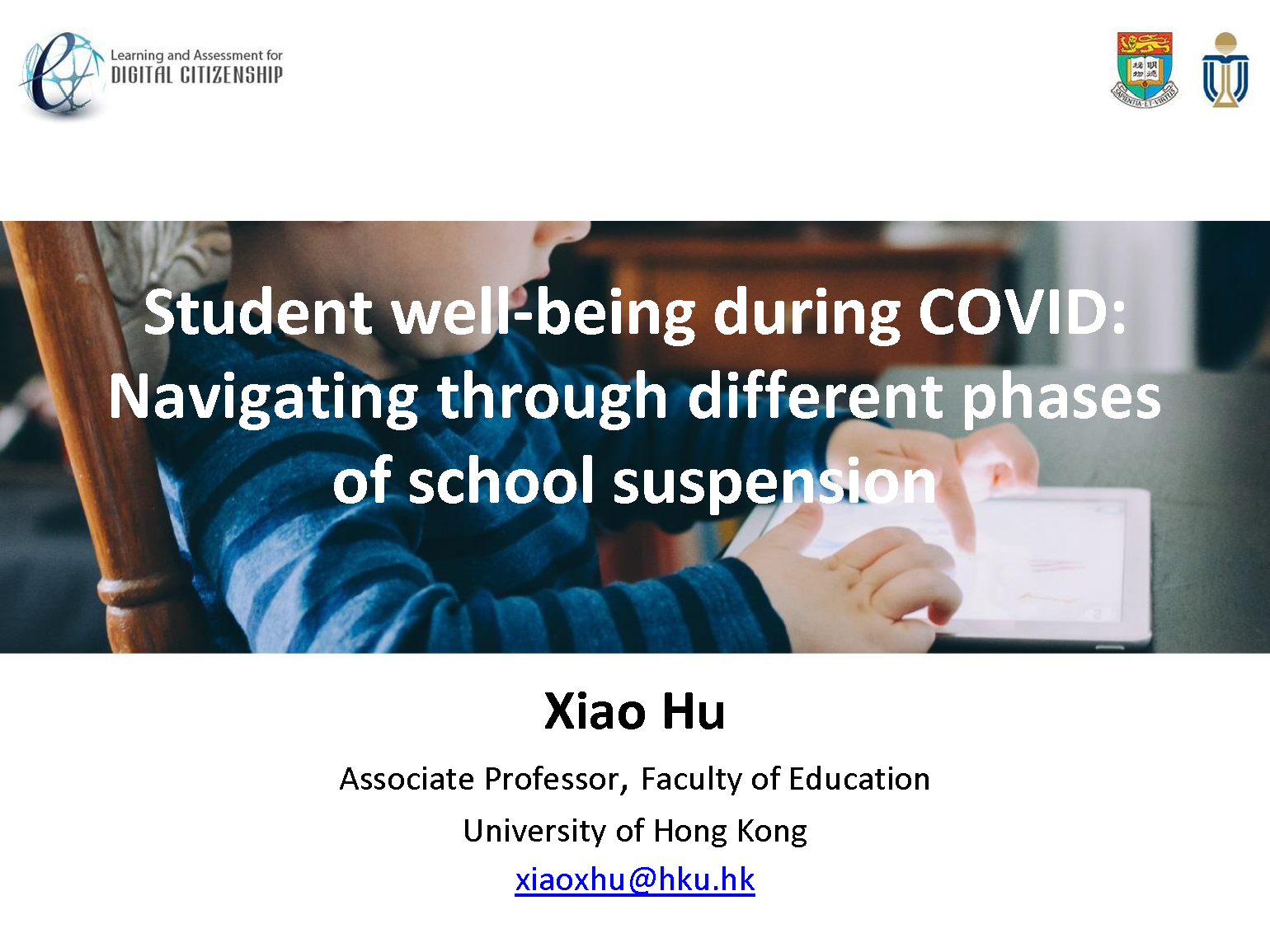 Talk 2 Presentation Download
Talk 2 Presentation DownloadDate: 21 June 2021 (Monday)
Time: 3:30 pm - 4:45 pm (HKT) (Calculate your local time)
Venue: Online via Zoom
Language: English
Discussant: Dr. Elizabeth Milovidov, J.D., Consultant, Council of Europe and Microsoft. More info
Enquiry: dcitizen@hku.hk
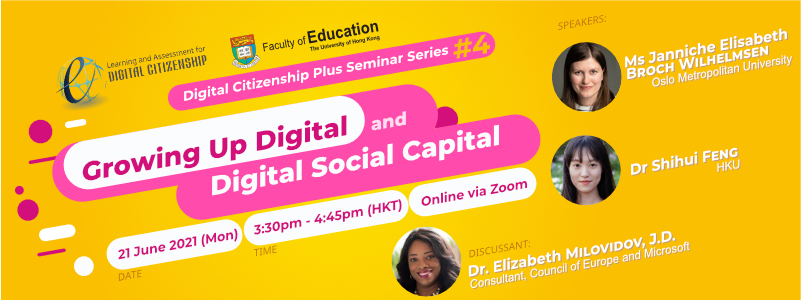
While we can safely say that most children today grow up surrounded by digital technology, it seems like both institutions and parents struggle with finding out how to moderate what kind of technology children should use and how to use it. Furthermore, we have little evidence focusing what children themselves think about digital technology and how they use it. This study focuses on digital technology in family life by giving children a voice and examining their experiences. The study is part of a larger EU Horizon 2020 project and includes 10 children ages 5-6 from Norway. The data includes focus group and individual interviews. In the study we examine issues such as what kind of digital technology children use, what they like and dislike and how they communicate about it at home (their own agency). The thematic analysis aims to understand what children’s experiences and thoughts are about growing up in an increasingly digital society. The data suggests that children often have a good understanding of what digital technology is, but that how it is used and when differs. This research adds to our understanding of digital technology from the perspective of children as part of the family ecosystem and it could have an impact on both family life and educational settings in terms of how we must consider what’s important for children growing up in a digital age.
About the speaker(s):
Janniche Elisabeth Broch Wilhelmsen
Janniche is a PhD fellow at Oslo Metropolitan University. She is a former first-grade teacher now researching digital family life with DigiGen. Employed at Oslo Metropolitan University at the Department of Early Childhood Education. Passionate about including the child’s perspective in the research field.
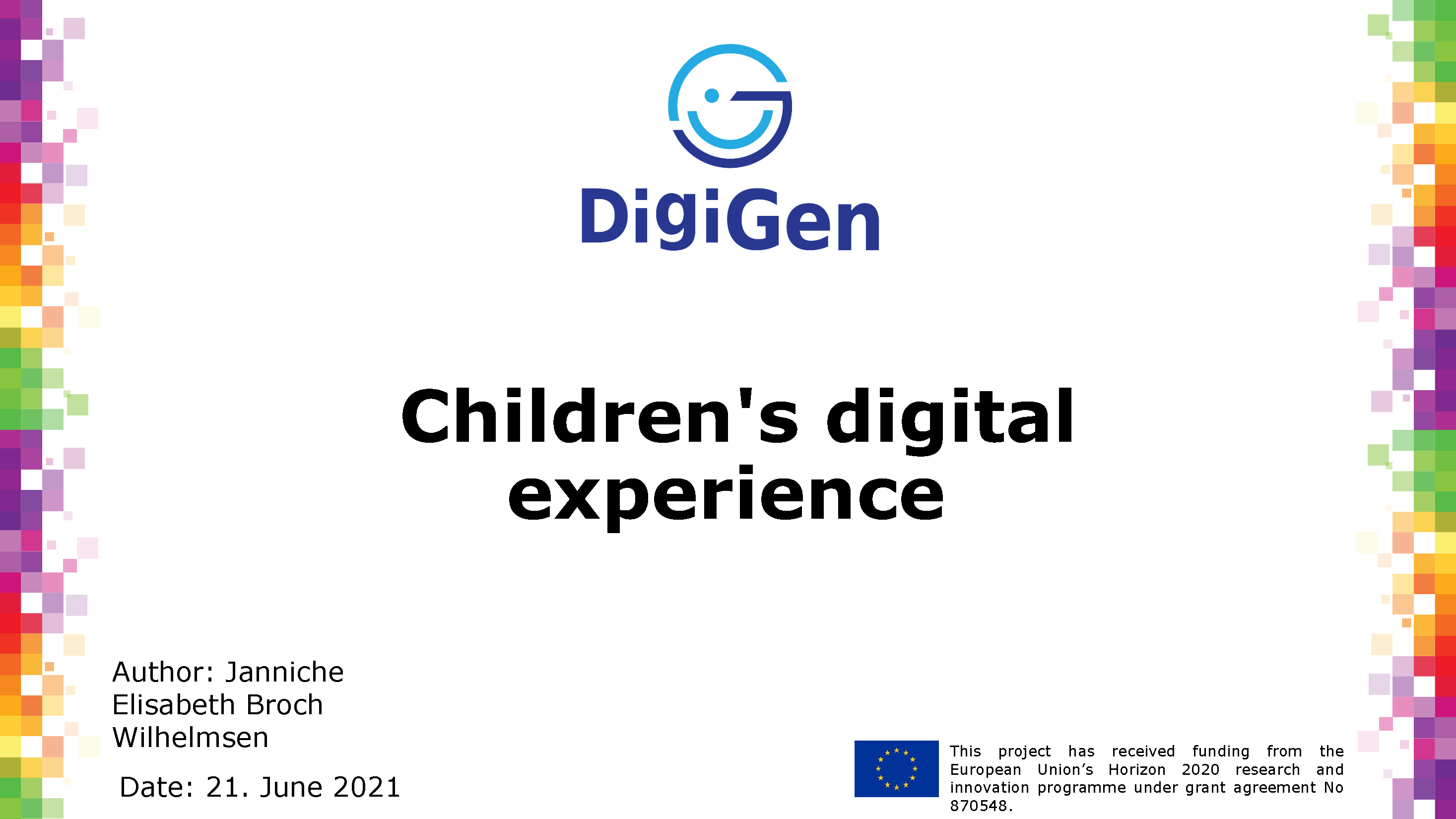 Talk 1 Presentation Download
Talk 1 Presentation DownloadThe central argument of social capital theory is that social connections are valuable assets. The access and use of the resources embedded in students’ social relationships are critical to students’ development. Digital technologies, such as social media, offer an alternative option for students to extend their social capital beyond their offline social circles. The new form of social capital in online environments enables students to develop their social resources proactively rather than depend on the accumulative resources shared through their family and school networks. It also provides an opportunity to advance our understanding of students’ social capital using the trackable online interaction data. This presentation will discuss the definition of digital social capital, the importance of digital social capital on students’ academic and socio-emotional development, as well as critical reflections on the digital divide and education equity from the perspective of digital social capital.
About the speaker(s):
Dr Shihui Feng
Dr Shihui Feng is an Assistant professor in the Unit of Human Communication, Development, and Information Science, Faculty of Education, HKU. Her research interest is in network analysis, social computing, and learning analytics.
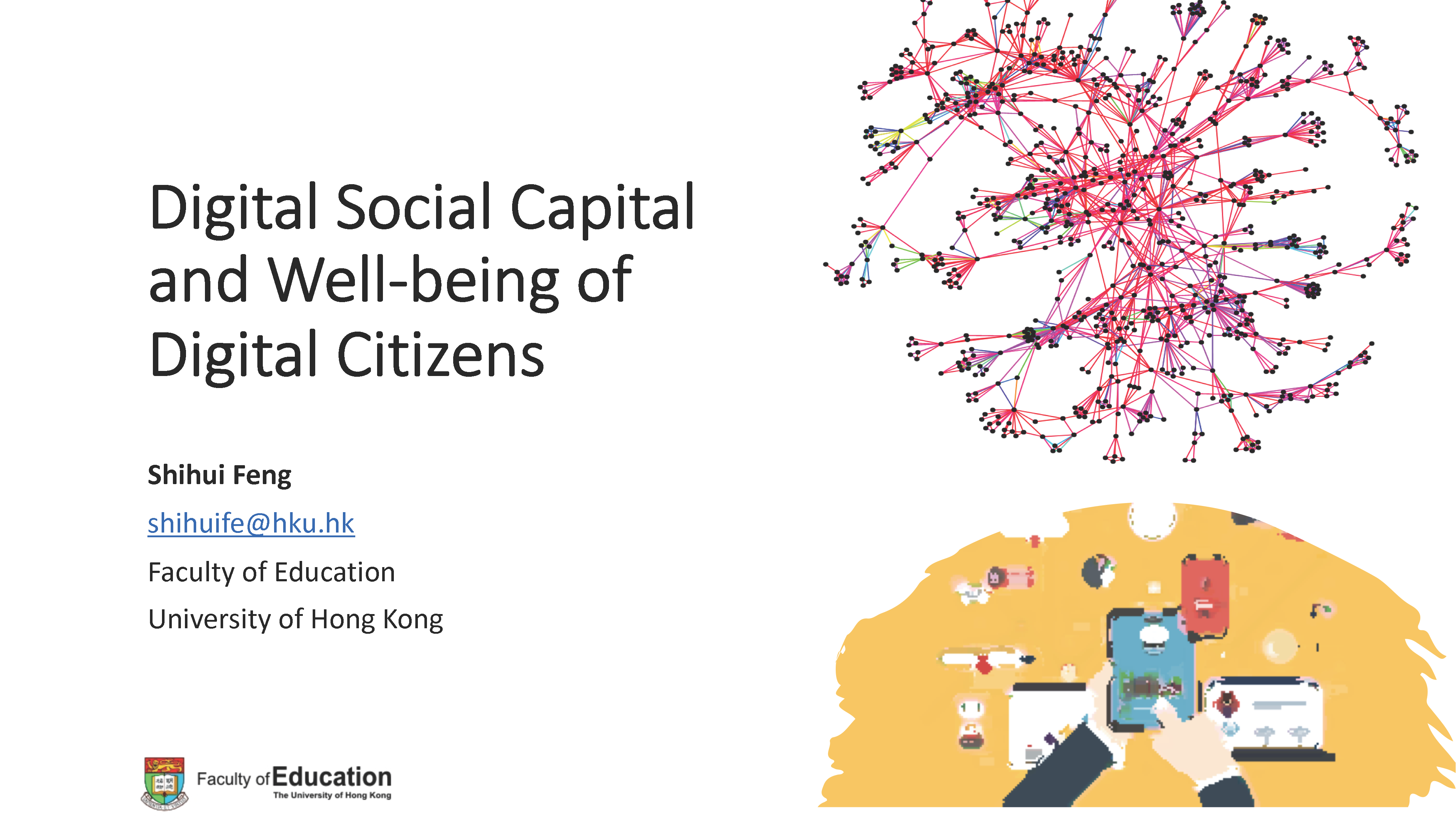 Talk 2 Presentation Download
Talk 2 Presentation DownloadDate: 7 June 2021 (Monday)
Time: 3:30 pm - 4:45 pm (HKT) (Calculate your local time)
Venue: Online via Zoom
Language: English
Discussant: Dr. Francesco Bailo, Lecturer in Digital and Social Media, University of Technology Sydney
Enquiry: dcitizen@hku.hk
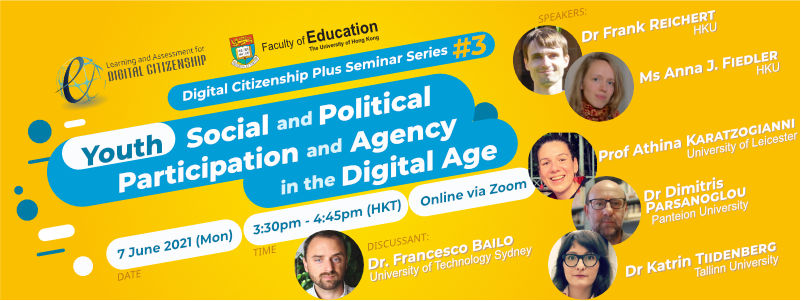
During the 2019 anti-extradition bill social movement in Hong Kong, the city saw peaceful mass demonstrations, a record voter turnout, and violent clashes. Digital forms of communication and new, creative ways of participation (e.g., citizens’ press conferences) shaped the image of the movement. University students were particularly active in the movement, and in this talk we examine how university students’ self-efficacy and their satisfaction with the local socio-economic and political situation – considered crucial factors for mobilization according to social psychological and social movement theories – may have influenced students’ participation in the social movement. The analysis disentangles the role of efficacy and dissatisfaction and their interactions. The results show differential associations of efficacy and dissatisfaction and indicate that political dissatisfaction is a particularly strong correlate of protest actions.
About the speaker(s):
Dr Frank Reichert
Frank Reichert is Assistant Professor at The University of Hong Kong, where he works on projects pertaining to civic education and engagement, digital literacy, social identity and protest action, and youth development. Before joining The University of Hong Kong, he worked in the German National Educational Panel Study and at the University of Sydney, Australia. He has received several awards (e.g., the Early Career Award of the Social Studies Research SIG of the American Educational Research Association in 2021) and is a current member of the steering committee of the Standing Group Citizenship of the European Consortium for Political Research.
Anna J. Fiedler
Anna J. Fiedler is a Research Assistant at The University of Hong Kong, Faculty of Education. She is a member of the editorial board of the DGA (German Association for Asian Studies) magazine “Asien” and worked as a consultant for the Friedrich-Ebert-Stiftung. She holds a B.A. in Sinology from Free University Berlin, Germany, and a research M.A. (hons) in Asian Studies from Leiden University, The Netherlands. Her research is driven by an interest in political participation, identity and social inequality.
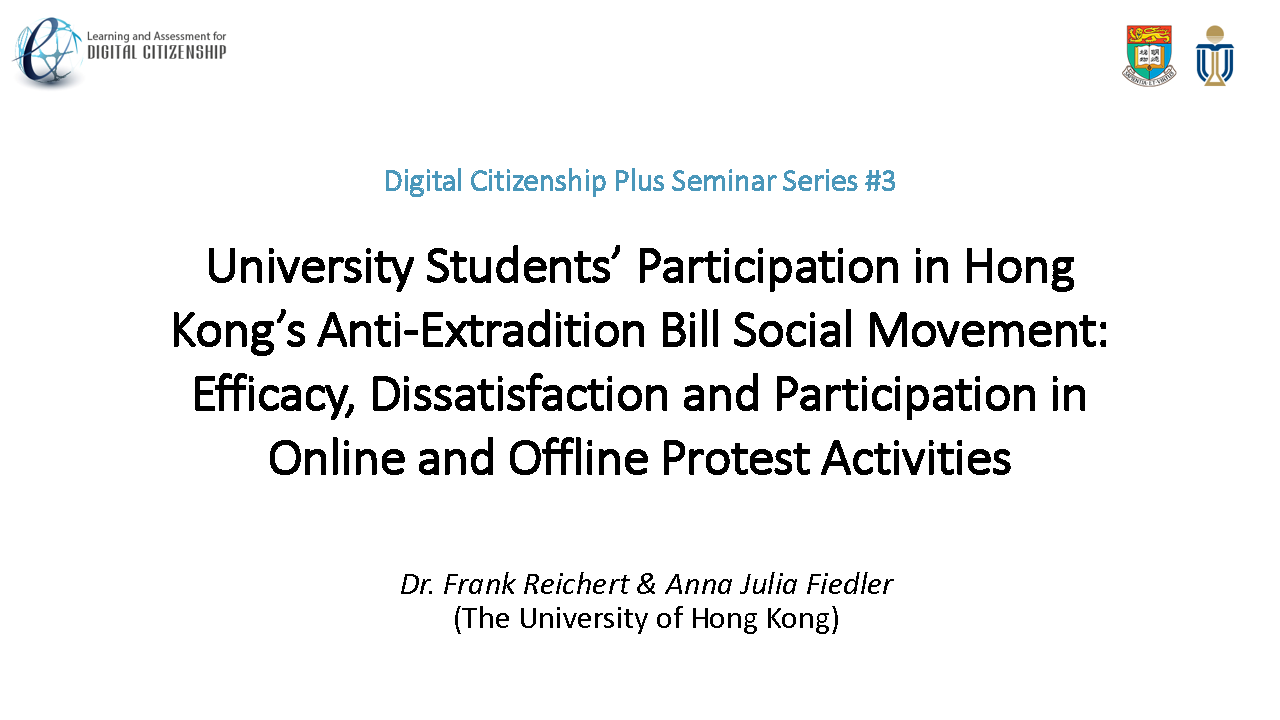 Talk 1 Presentation Download
Talk 1 Presentation DownloadThis paper report on finding from a Horizon 2020 project ‘DigiGen’ in which three teams from Estonia, Greece and the United Kingdom are researching ‘ICT and transformations of civic participation’, focusing on adolescents between the ages of 16-18 years of age. We investigate the context within which the political behaviour of young people is manifested online and assess the extent to which it affects offline political practices. Within the evolving ecosystem in these three sociopolitical/national contexts this comparative study, defines political engagement broadly as encompassing both grassroots mobilization, activism and participation in institutionalized politics as well as new participatory repertoires. We employ a triangulated methodology, using the following research techniques: netnography, digital storytelling workshops, and multimodal critical discourse analysis. We have also identified four areas of interest: digital citizenship (e.g. access, commerce, communication, literacy, etiquette, rights and responsibilities, health and well-being, security/safety, data justice, digital inequalities). Second, digital media use by adolescents (and specific problems relating to adolescence). Third, digital activism scholarship (with specific focus on youth participation in social movements, everyday activism, new participatory repertoires, and leadership emergence theories in social movements). Fourth, youth political culture and digital activism/citizenship specific to each country and the identification of cross-cultural continuities and discontinuities that may emerge in comparison. This paper reports on data from the first phase of the project focusing on results from the netnography data in each of the three countries.
About the speaker(s):
Professor Athina Karatzogianni
Athina Karatzogianni is a Professor in Media and Communication at the University of Leicester. She cannot make her mind up whether she is more interested in the empirical research or the theoretical problems emerging from ICT use by social movements, protest, and insurgency groups.
Dr Dimitris Parsanoglou
Dimitris Parsanoglou is a Senior Researcher at Panteion University. He holds a DEA and a PhD in Sociology at the Ecole des Hautes Etudes en Sciences Sociales in Paris. He has participated in several national and European research projects and has extensively published on history and sociology of migration, on employment, youth, urban space and gender.
Dr Katrin Tiidenberg
Katrin Tiidenberg is a Professor of Participatory Culture at Tallinn University, Baltic Film, Media and Arts School and on the Executive Board of the Association of Internet Researchers. Author of multiple books on social media. Research interests include social media, sexual practices, visual culture, participatory practices, norms and digital research methods and ethics.
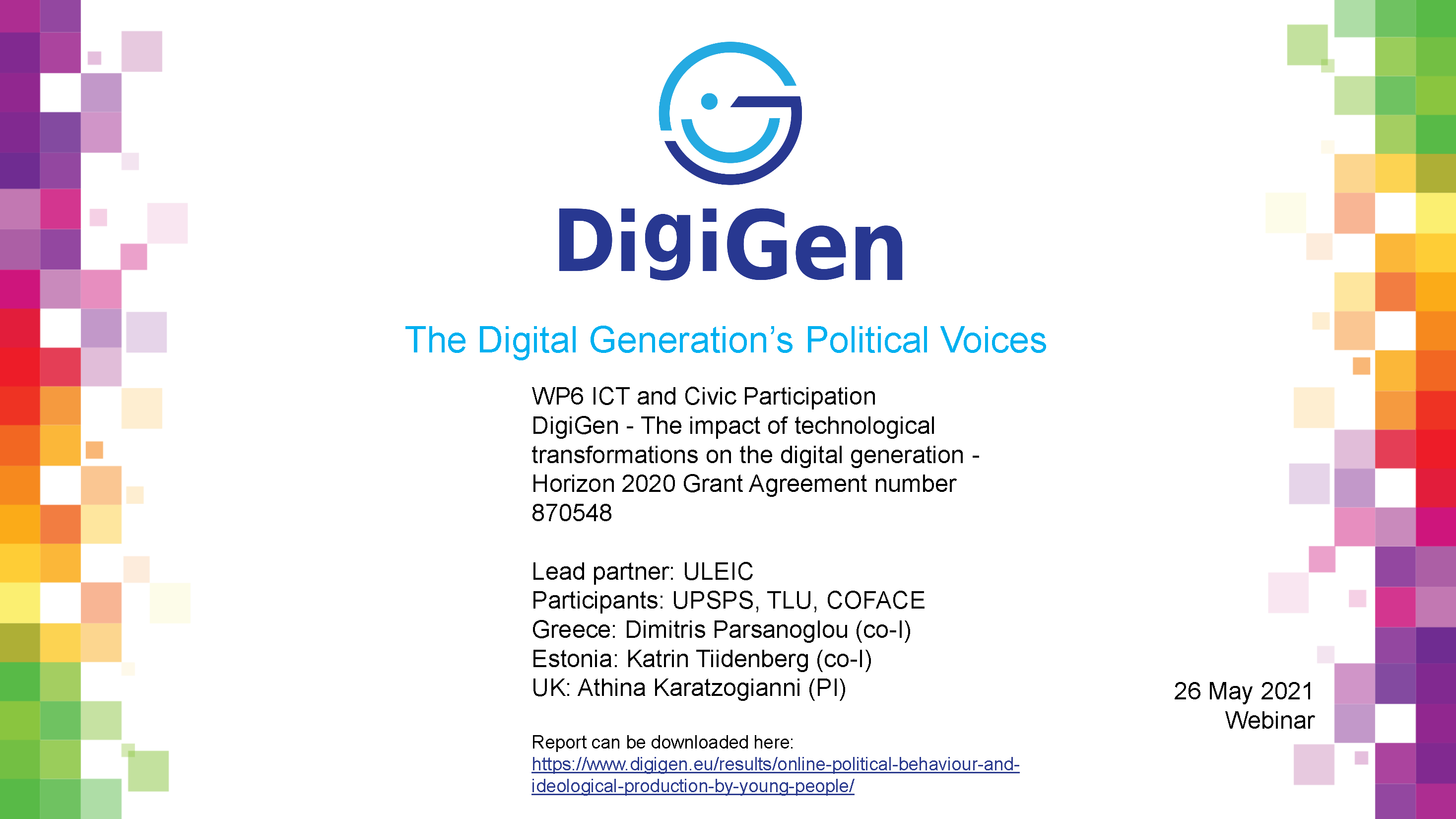 Talk 2 Presentation Download
Talk 2 Presentation DownloadDate: 24 May 2021 (Monday)
Time: 3:30 pm - 4:45 pm (HKT) (Calculate your local time)
Venue: Online via Zoom
Language: English
Discussant: Mr Kjartan Ólafsson, Assistant Professor, University of Akureyri
Enquiry: dcitizen@hku.hk
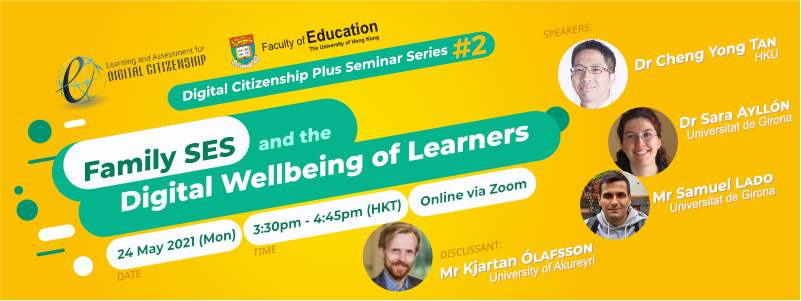
This study investigates (a) how parental involvement varies according to familial socioeconomic status (SES) and (b) how this involvement influences students’ online learning experiences and outcomes during the COVID-19 school suspension in Hong Kong. It examines survey data collected from 932 secondary school students and their parents during June-July 2020, when schools resumed briefly after their suspension since the end of January. The analysis shows that students’ learning experiences during the school suspension (online participation, challenges encountered) and outcomes (acquisition of digital skills and self-regulation during school suspension, anxiety post school resumption), and extent of parental involvement (home and school) vary significantly with their familial SES, thereby underscoring the complexities in digital divide. It also highlights the need for comprehensive measures that include the provision of parental support to ensure the quality of students’ learning experiences and outcomes, particularly when online learning becomes the only means of educational provision.
About the speaker(s):
Dr Cheng Yong, Tan
Cheng Yong Tan is Associate Professor at the Faculty of Education, The University of Hong Kong. His research program unravels home and school factors that influence student achievement and comprises socioeconomic inequality in student achievement and school leadership. It is premised on Bronfenbrenner’s ecological theory that argues for the need to understand human development in multiple contexts such as the home and school.
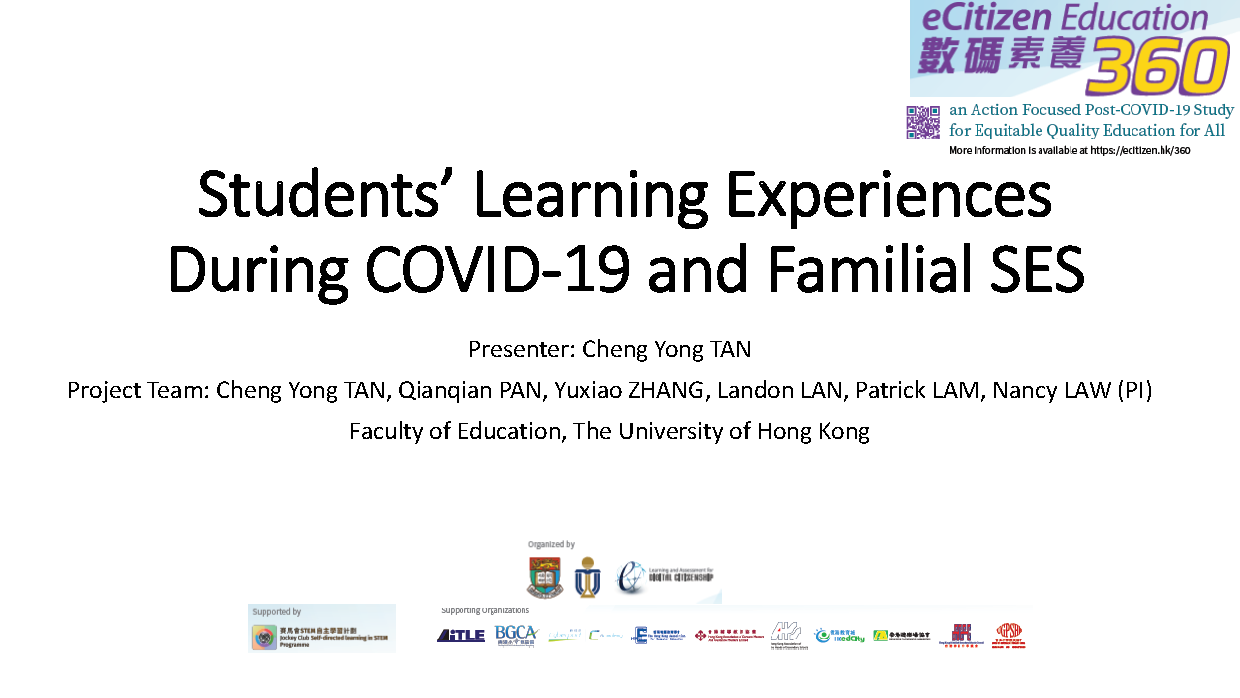 Talk 1 Presentation Download
Talk 1 Presentation DownloadThe outbreak of the COVID-19 pandemic has completely changed the need for internet connection and technological devices among the whole population, but especially so, among school-aged children. For a large share of schoolers, access to a connected computer nowadays makes the difference between being able to keep up with their educational development or staying out of it. This paper provides a detailed account of the digitally deprived children in Europe, according to the latest wave available of the European Union – Statistics on Income and Living Conditions (EU-SILC). We find that 5.3% of school-aged children in Europe are digitally deprived and that differences are large across Europe. Children that cohabit with low educated parents, in poverty or in severe material deprivation are those most affected. We argue that digital deprivation should be considered as part of the definition of material deprivation used by the European Commission to monitor the progress of European societies.
About the speaker(s):
Dr Sara Ayllón
Sara Ayllon is an Associate Professor at the Department of Economics at the Universitat de Girona (Spain). She obtained her PhD at the Applied Economics Department at the Autonomous University of Barcelona (UAB) in 2009. Previously, she graduated from an MSc in European Social Policy at the London School of Economics and she holds a BSc in Economics and another one in Journalism at UAB. Her research focuses on the Economics of Poverty and Inequality, Economics of the Family, Labour Economics, Health Economics and Applied Microeconometrics.
Samuel Lado
Samuel Lado is a Research assistant at the Department of Economics at the Universitat de Girona (Spain). He holds two bachelor’s degrees, one in Economics and the other one in Business Administration and Management from the University of Girona. Currently he is pursuing a master’s degree in Economic Analysis at the Open University of Catalonia, while he is working as a research assistant and adjunct lecturer in the Department of Economics at the University of Girona.
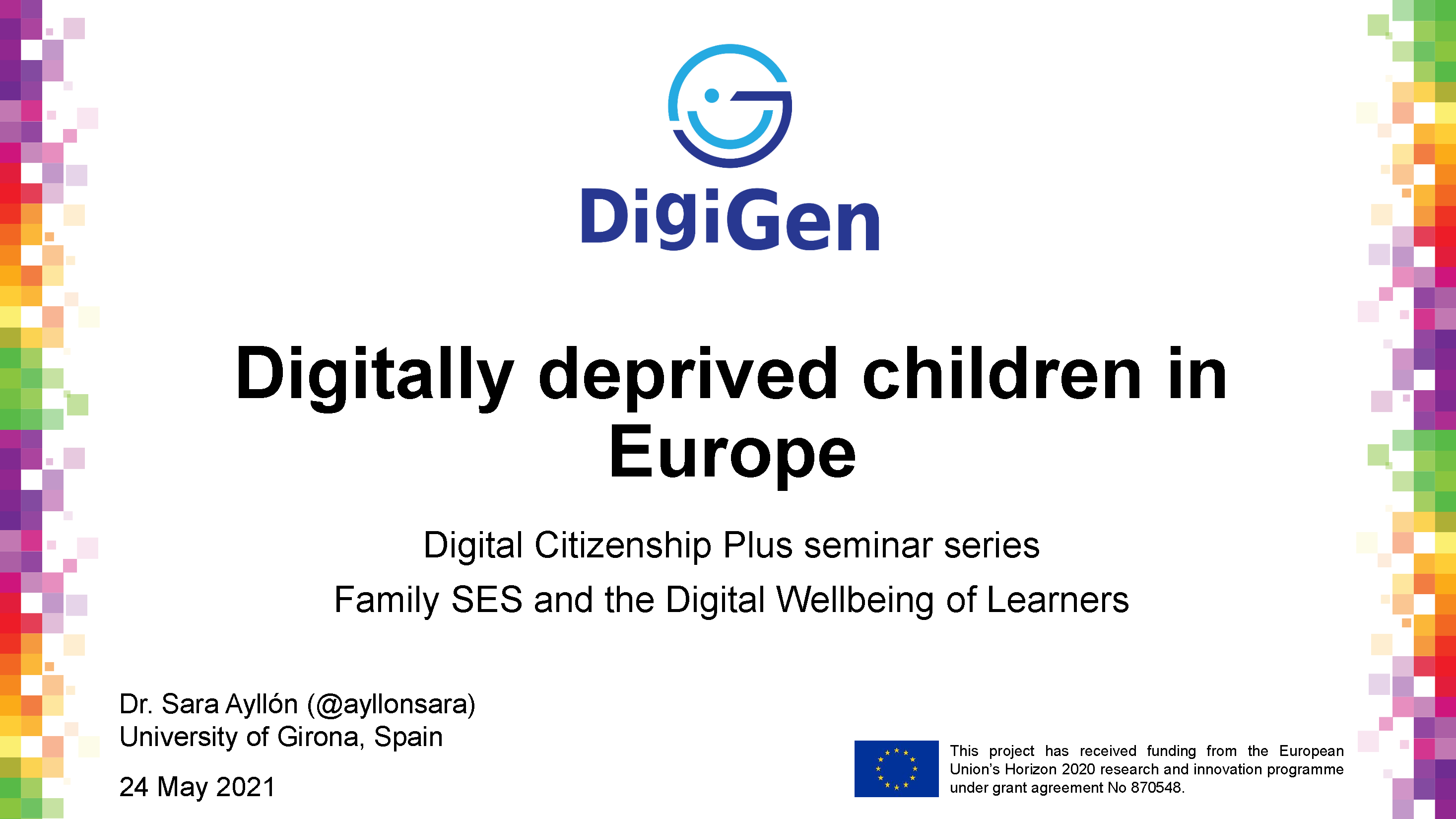 Talk 2 Presentation Download
Talk 2 Presentation DownloadDate: 10 May 2021 (Monday)
Time: 3:30 pm - 4:45 pm (HKT) (Calculate your local time)
Venue: Online via Zoom
Language: English
Discussant: Professor Ola Erstad, Professor and Head of Department, Department of Education, University of Oslo, Norway
Enquiry: dcitizen@hku.hk
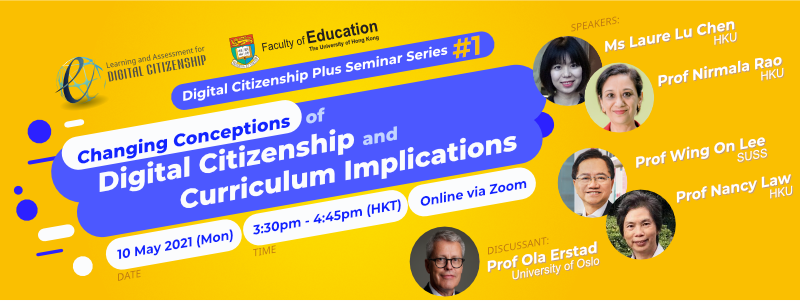
Digital Citizenship (DC) has attracted increasing attention from diverse sectors, including research, policy and educational practice. This talk will present key findings from an integrative review that examines the conceptualization and measurement of DC across disciplines. A systematic search of 11 databases identified 350 unique outputs published between 1999 and 2018 that contained “digital citizenship” in the title or keywords. Among these, 114 peer-reviewed journal articles published in a wide range of discipline-specific venues were subject to further analyses. In empirical studies of DC across disciplines, Ribble’s and Mossberger’s conceptualizations of DC remain the most prevalent over the past two decades, apparently unaffected by the conceptual developments in DC literature. Findings also revealed a lack of empirical research with young children, and an absence of commonly adopted research instruments for similarly framed DC-related constructs. Implications of the findings for research and policy will be briefly discussed.
About the speaker(s):
Laure Lu Chen
Laure Lu Chen is currently a PhD student in the Faculty of Education and works for the Learning and Assessment for Digital Citizenship project. Her research interests lie in digital technology education, digital inequality, digital literacy and digital ecology.
Professor Nirmala Rao
Professor Nirmala Rao is Serena H C Yang Professor in Early Child Development and Education, Faculty of Education, The University of Hong Kong. A Developmental and Educational Psychologist by training, her research on early childhood development and education has been recognised internationally. She is a Co-PI on the Learning and Assessment for Digital Citizenship project and she is particularly interested in developmental changes in digital citizenship and the impact of home learning environments on digital competence.
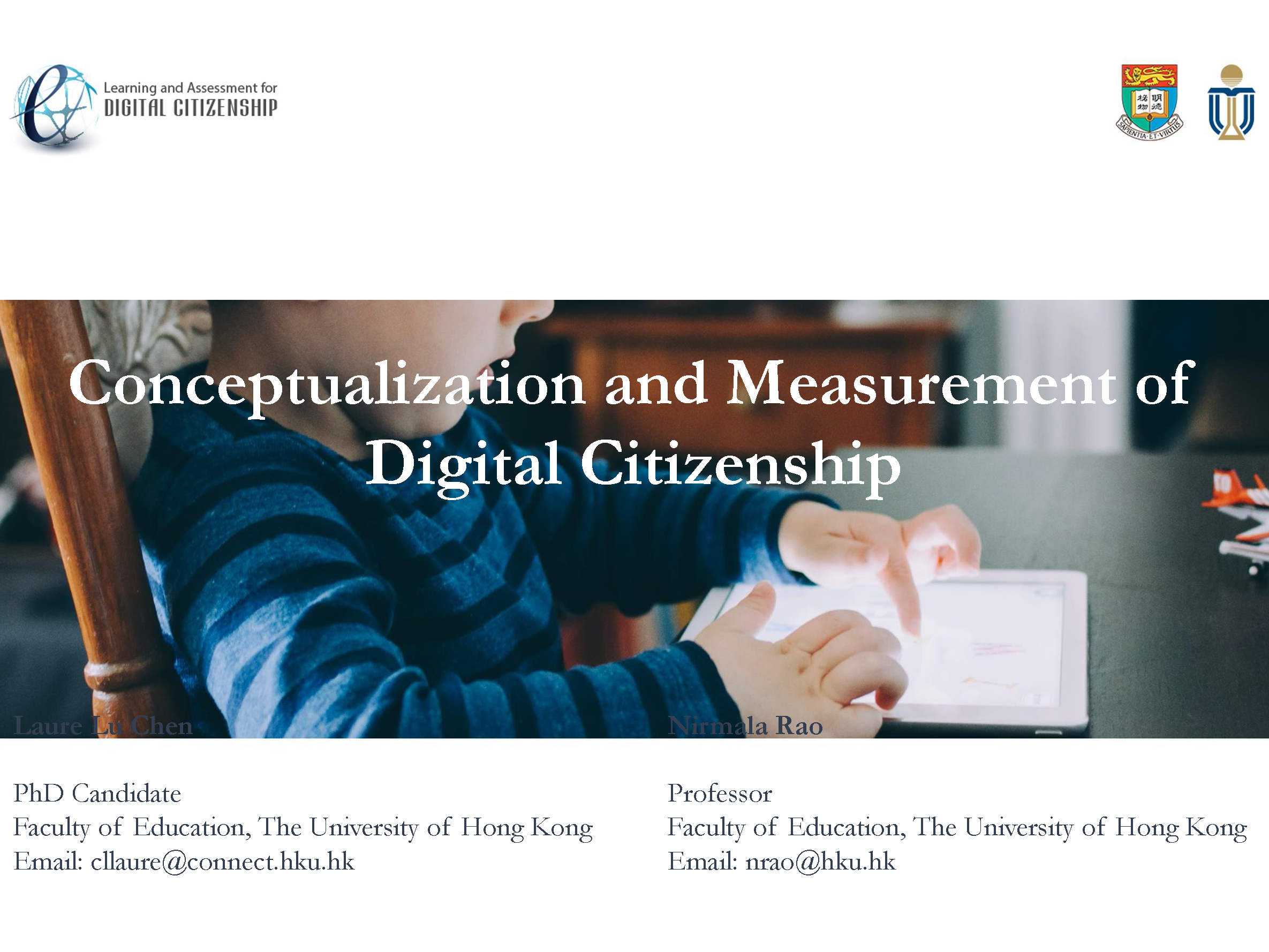 Talk 1 Presentation Download
Talk 1 Presentation DownloadCitizenship has long been a part of the formal school curriculum in many countries with a strong focus on social engagement and participation. On the other hand, digital citizenship in education policy or professional documents has typically focused on digital competence and e-safety, and rarely on Internet-mediated social engagement and participation. This contrasts with the widespread use of social media to rally support and coordination of place-based protests since the early 2010s. Students, including tweens and teens, empowered through easy information access (including fake/bogus information) and extensive connectivity, have participated actively in on- and off-campus protests. This presentation examines the current disconnect between citizenship and digital citizenship curricula and raises concerns regarding preparation of students for digitally mediated participation and social engagement for personal and social wellbeing.
About the speaker(s):
Professor Wing On Lee
Dr Wing On Lee is Professor and Executive Director of the Institute for Adult Learning and Professor at the Singapore University of Social Sciences. He is the Series Editor for 3 Routledge Book Series and 1 Springer Book Series, including the latest Routledge-IAL Adult Learning for Emergent Jobs and Skills Series. He is currently co-editing the Springer International Handbook on Lifelong Learning and Springer International Handbook on Education Development in Asia-Pacific.
Professor Nancy Law
Dr Nancy Law is a Professor in the Faculty of Education at the University of Hong Kong, and the Founding Director for the Centre for Information Technology in Education (CITE). She is currently leading the Learning and Assessment for Digital Citizenship and eCitizen Education 360 projects as their Principal investigator.
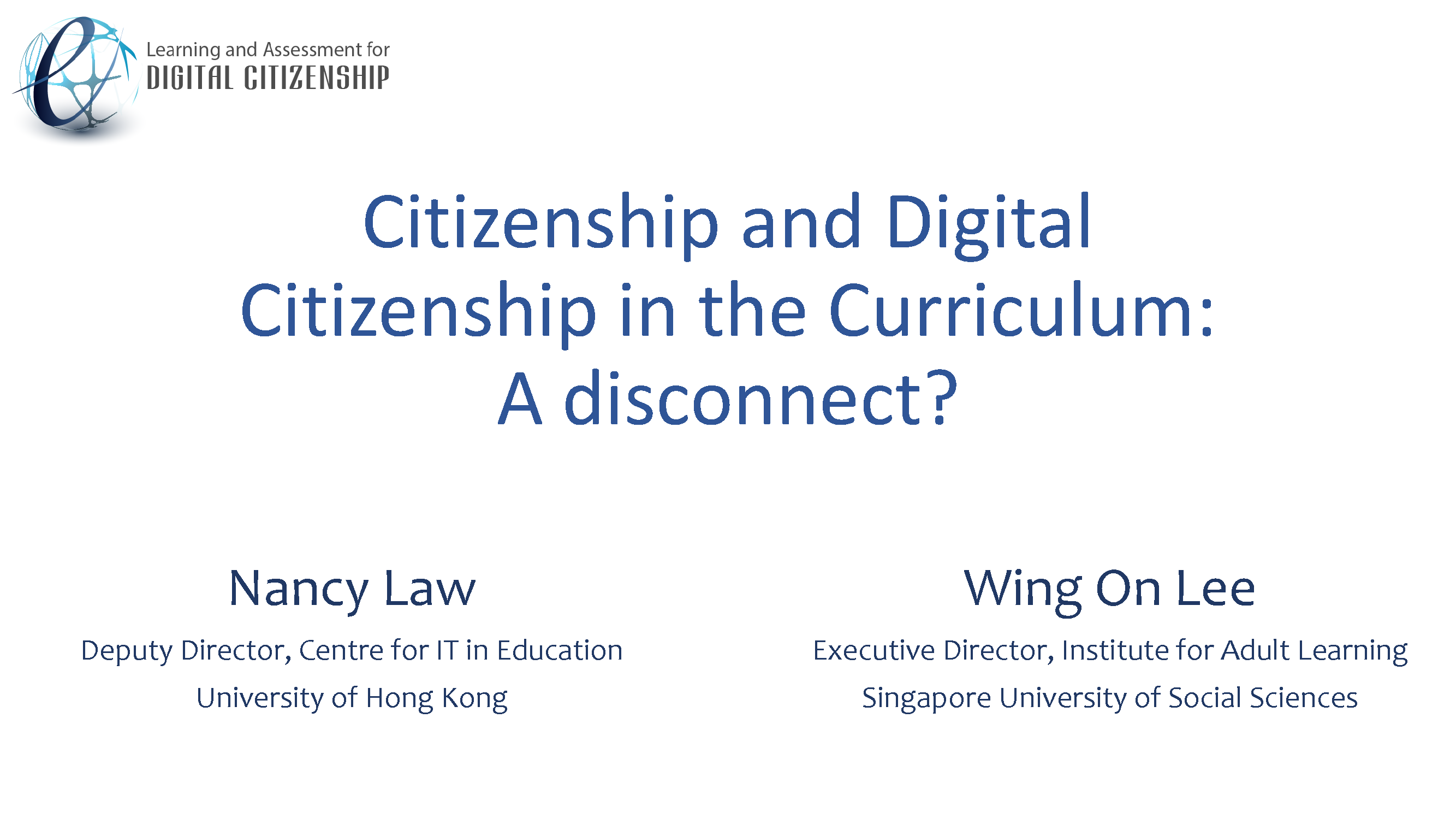 Talk 2 Presentation Download
Talk 2 Presentation Download